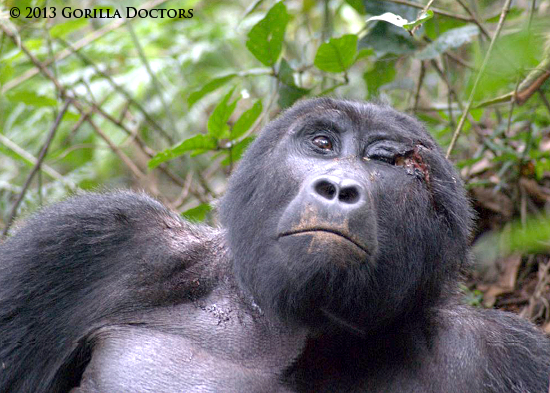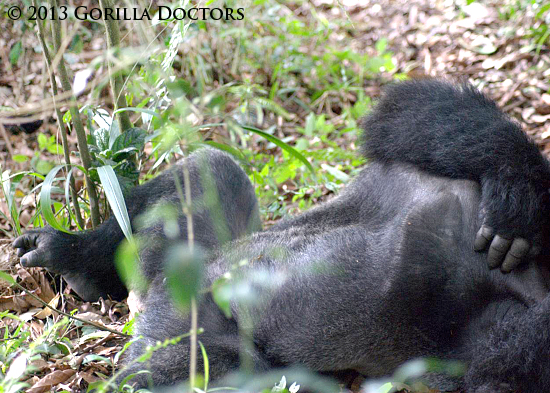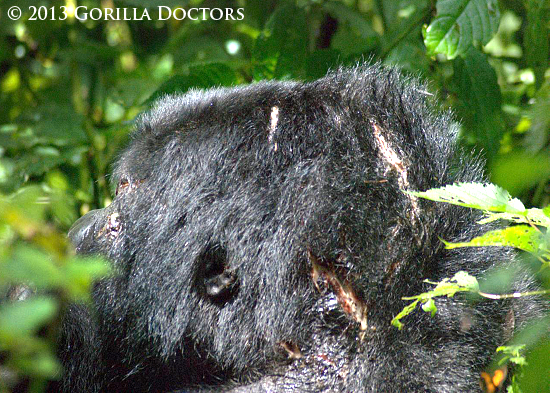Dr. Fred Intervenes to Treat Silverback’s Injuries in Bwindi
By Gorilla Doctors Staff on Friday, May 10th, 2013 in Blog.Dominant silverback Makara, of Habinyanja group in Bwindi Impenetrable National Park, was severely injured after a fight with a wild gorilla group on May 3rd. With wounds on his wrists, hands, face and back of head, the silverback was left exhausted and in need of a veterinary assessment. Dr. Fred trekked to the group on May 4th and 5th to observe and treat the silverback. Here is his report:
“The Bwindi Park warden contacted me after Makara was severely injured in a fight on Friday May 3rd. In addition to his many wounds, the silverback was reportedly not feeding and spending ample amounts of time lying on the ground. After meeting with the Warden and Bwindi trackers to discuss the case, I trekked to the group on May 4th to assess his condition and on May 5th for a medical intervention.
 Silverback Makara’s injury on his left eye.
Silverback Makara’s injury on his left eye.
We found Habinyanja group in thick primary forest on the first day, in the Ntungamo area of the park, at an altitude of 1792 meters. Trackers reported that the group had been feeding less and moved in dissaray without Makara’s leadership and control. On the first day, Makara was found with his group, resting on his back with both wrists and legs raised. He licked the wound on his left hand from time to time. He turned onto his stomach as if he wanted to move, but could not rest his hands comfortably on the ground. His body appearance was fair, but his stomach appeared to be almost empty.
 Silverback Makara’s stomach appeared empty during the first day of observation.
Silverback Makara’s stomach appeared empty during the first day of observation.
He was alert, but his level of activity was not good. He moved a few meters and stopped during the first day of assessment. He could not use his left limb during travel at all. Several of his injuries were open bite wounds, with raw, swollen edges. The wounds were dispersed all over his head, shoulders, back and left hand and wrist. Additionally, he had a large wound on the left eyelid, above the left ear, on the scalp and right cheek. The injuries gave off a slightly bad smell, indicating that infection may have been setting in.
 Severe bite wounds on the back of Makara’s head were beginning to get infected.
Severe bite wounds on the back of Makara’s head were beginning to get infected.
On the second day of assessment he had failed to catch up with his moving group. He was not actively feeding and his group members had left him behind, lying on the ground. A medical intervention was clearly necessary if Makara was going to recover from these extensive injuries. However, because the group had already moved on without him, full immobilization for a medical intervention was not preferred. Instead, I made the decision to dart him with an antibiotic (Ceftriaxone) and an anti-inflammatory/pain killer medication (Ketoprofen) to fight the infection in his wounds, alleviate pain, and speed up his healing.
Trackers reported that the following day, Monday, May 6th, that Makra had joined up with his group members. He was observed actively feeding, but his stomach was not full yet. Trackers will continue to closely monitor Makara’s continued recovery and report any abnormal behavior if it should arise.”
You can follow the Gorilla Doctors health monitoring efforts on our Facebook page, where we post photos and notes from our monthly visits.
Please consider supporting us by making a secure online donation. Every dollar you give goes to directly supporting our gorilla health programs and One Health initiative. Thank you for your generosity.


 Donate
Donate